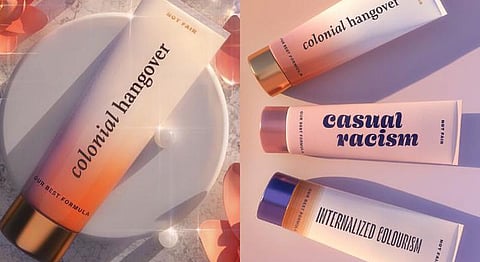
- HOMEGROWN WORLD
- #HGCREATORS
- #HGEXPLORE
- #HGVOICES
- #HGSHOP
- CAREERS
- ABOUT US
- CONTACT US

Discrimination on the basis of skin colour has a long history in Indian society. It emerged as one of the tools of colonial domination in British India where anyone with a whiter skin tone was privileged over the ones with a darker complexion. Even though today awareness around colourism and racism has increased, Indians continue to fall back on the colonial legacy which taught them to worship the white and despise the dark. A lighter skin tone continues to be the hallmark of a beautiful face, especially for the female. This bias has infiltrated the society in such a monumental way that it even finds overt mention in an Indian textbook claiming a white-skinned woman to be beautiful and her darker counterpart to be ugly. Such discriminatory information thus reaches the younger population in covert ways through educational institutions which are meant to challenge them in the first place.
Thus, it can safely be said that colourism is only partly a colonial legacy. Today, it has become an extension of the capitalist discourse, which endorses colourism by promoting skin-whitening cosmetics and products. Ample instances of unethical branding campaigns and advertisements promoting colourism can be cited, one of the overt examples of which is the skincare brand, Fair & Lovely, which equates ‘fairness’ with ‘beauty’, and is a cream that has seen widespread popularity in India. However, they recently hogged the limelight by changing the age-old name to Glow & Lovely, as well as removing the bleach as one of the ingredients in the cream.
Even though it has been touted largely as a publicity gimmick aiming for political accountability, Anushka Sani, Founder and Creative Director of Mumbai-based creative agency, Thought Over Design, detects a silver lining in it. She believes that it is a step in the right direction. However, she feels that merely changing the name of a product is an exercise in futility, and what is really needed is an overt message making people aware of the potential colourism and racism that it can give rise to. In citing a blog post by Leeza Mangaldas, she claims that,
“Just the way smoking cigarettes comes with a warning, so should products like these.”
It was then that she and her creative team at Thought Over Design Studio thought of a mock campaign called #NotFair, which actually said what those skin-whitening products really were, “not in the way that cigarette packets would, but in a more appealing way, which is what branding and packaging does.” The campaign was created with the intention of infusing a sense of irony with the packaging of the products, which was given names like “colonial hangover”, “internalised colourism” and “casual racism”, as a way of overtly stating what those products are actually about. She agrees that branding and packaging can really be misused by people to represent things incorrectly, and thus one should be careful about trusting brands blindly. Thereafter, it was placed in a setting reminiscent of how fairness creams are usually sold.
They have made such campaigns for other brands including Dalberg, for whom they built an awareness campaign around unpaid care work done by women. Educating people to help women in the household because they end up doing double the work, was one of the aims of the campaign. Other than that, they have also done many purpose-driven commercial campaigns under the banner of their creative studio, Thought Over Design, which privileges thought over design, as evident in its very name.
“We believe that everything should be thoughtfully done, as opposed to just for aesthetics,” says Anushka, who believes in branding with a sense of purpose. She founded Thought Over Design 6 years ago with a vision to create conscious branding strategies in order to build businesses that can address what we actually need in our lives. The recent NotFair campaign done by them is an instance of how social messages can be passed on through branding, and how in turn, they affect discourses in culture and subculture.
As a dark-skinned girl herself, it is easy for her to recount unsolicited advice from near and dear ones, telling her to not go out in the sun, or to wear sunscreen at all times. Being a beach-bum who loves diving and being outdoors most of the time, the advice was not something she could follow to the letter. However, she believes that it doesn’t come from a place of ill intention, and is chiefly because they grew up with a certain conditioning, passing it on to us in the most harmless manner.
“In fact, the industry works like this - and I have been to dermatologists and salons who continue to offer skin brightening treatments very casually,”she says.
She feels that it is not necessarily a bad thing always, provided it’s a conscious and well-informed choice.
“Ultimately, what I want to do with my body or skin is my decision.”
“Instead of judging people for wanting to be a certain way, what we should do is empower them with the right information.”
In terms of impact, she believes that even though these small pieces of work are not going to create the large-scale impact that we need, small initiatives like these can lead to someone starting a larger conversation with their family and relatives, as well as with themselves and the society at large.
The campaign has been designed by Jyoti Iyer, Kushagra Gupta, and Anushka Sani from the Though Over Design studio.
You can check out their campaigns here.
Check out their website here.
If you enjoyed reading this article, we suggest you also read:
